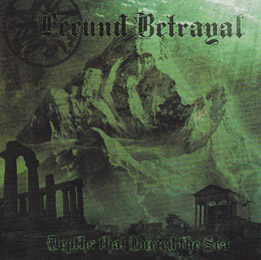
The first time that I listened to this album – I bought it shortly after the release date in my favorite CD-store – I was pretty enthusiastic about the approach of this Illinois-based duo, consisting of Dylan Taylor (bass and guitars; he also writes the lyrics) and Nostaum (vocals, guitars, drums and keyboards) (he’s a founding member of Wrathful Plague as well; the review on the Thee Within The Shadows-album will follow very soon, by the way). Recently Metallic Media did send us a package in which this album was included too, so I will have the politeness once again to have this material reviewed in order to promote it once again, for it deserves to be heard.
What this album brings (it’s the sole album by the duo until now, by the way; I hope these guys are writing and recording new stuff in mean time), is seventy two (!) minutes of funereal and desolate spheres, registered at the band’s home studio (Nostkrieg Studio it is called). After the minimal-ambiental intro The Descent, Fecund Betrayal perform eerie, haunting, grim and depressing Funeral Doom, which includes lots of atmospheric synths, acoustic excerpts (cf. Riders Of Death) and prominent church bells (like in This Poison Of Life), besides the ‘traditional’ Metal-instruments. The vocals, excuse me, I mean the growls, are extremely abyssal and, at the same time, hypnotic (I know that this might be a strange comparison, but you’ll understand if you hear them). Besides there are some other vocal lines too, like moaning, crooning or sighing. The riffs and rhythms are, besides being enormously slow, rather supportive than leading, with back-layered drum patterns that give the whole a specific ritual identity. You can’t really talk about ‘songs’ for the cold atmosphere prevails on melodious craftsmanship (the keyboards are more pronounced than the electric strings), but all of those compositions are created to dream away with. But I assure you that those ‘dreams’ will not deal with joy and happiness – but I am sure that this is an evidence you did understand in mean time. The few piano parts sound as if they are created for a funeral (read: ‘funeral march’, if you get the chopin-ish hint) specifically, with all joy and happiness included, of course.
Anyway, in essence Depths That Buried The Sea is minimal, repetitive and simplistic (once again: these definitions are meant as a compliment, evidently). And the very long individual epics might be quite some challenge to enjoy. But dark-minded souls, like undersigned, will recognize the beauty of this Aural art. This material reminds me a lot to the likes of, let’s say, Ahab (at least the debut!), Profetus or Merkstave, but especially Until Death Overtakes Me (and comparable acts created by Stijn van Cauter) are an important comparison.
